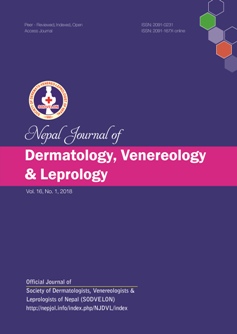Psychological Impact of Acne Vulgaris in Basic Science Medical Students in Nepal
DOI:
https://doi.org/10.3126/njdvl.v16i1.19401Keywords:
Acne vulgaris, health education, sebaceous gland, students, medical, surveys and questionnairesAbstract
Introduction: Acne vulgaris is a disorder of the sebaceous gland affecting mostly the adolescent age. Although acne does not cause direct physical impairment, it can produce significant psychosocial stress. Due to the paucity of data, there is a poor understanding of etiopathogenesis, treatment and psycho-social impact of acne in the Nepalese population. This study is the first of its kind in Nepal.
Objectives: To determine the beliefs, knowledge, misconceptions, myth, psycho-social impact about acne in recently joined undergraduate medical students attending basic science.
Materials and Methods: A cross- sectional study was conducted in two medical colleges in Kathmandu affiliated to Kathmandu University (KU), which followed the same curriculum. Medical students of basic science were enrolled in the study. Self-administered questionnaire was used to collect the data regarding their belief and perception about acne.
Results: A total of 247 students constituted the study population and female to male ratio was 1:1.62. Stress, oily skin, poor hygiene were the most common causative factors for acne. Belief and perception of acne included bad blood, menstrual cycle, eve teasing, evil eye. According to them, the best way to treat acne was herbal remedies. They liked to explain acne as being related to puberty, followed by dirty face. Psychological impact of acne was embarrassment
followed by lack of confidence and impaired social contact. Suicidal tendency due to acne was found in 3.6%.
Conclusion: Misconception about acne are widespread and enduring among basic science medical students. Health education program on acne is needed to improve their condition.
Downloads
Downloads
Published
How to Cite
Issue
Section
License
Copyright on any research article is transferred in full to Nepal Journal of Dermatology, Venereology & Leprology upon publication. The copyright transfer includes the right to reproduce and distribute the article in any form of reproduction (printing, electronic media or any other form).




